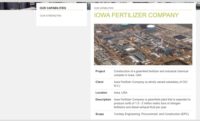SmithGroup Inc.'s continuing operations lost $14.9 million in 2001 on gross revenue of $136.6 million, as costs associated with the company's rapid expansion and diversification mounted and revenue tapered off with the slowing economy. The loss hit longtime shareholders hard after a revaluation of SmithGroup shares cut the value in half to $9.12.
The losses included expenses associated with integrating the operations SmithGroup acquired in recent years, reserves on losses on real estate investments, lease buyouts for vacated offices and severance for workers whose jobs were cut, according to Carl Roehling, president and CEO. The Detroit-based architect returned to profitability in 2002's first quarter, he says.
The sharp drop in share value upset a number of former and present staff members, some of whom were present at a shareholder meeting held in late April. "We were concerned and asked for an explanation, and it was a very vague answer," claims one. "Needless to say, there is a lot of concern among shareholders that retirement funds won't be there."
The company has reduced its board from 17 members to 10 during the past year and total employment has stabilized at 950. Roehling says that several longtime employees were asked to leave and others chose to leave on their own.
Smithgroup's biggest shareholder, former chairman, president and CEO Arnold Mikon, departed recently. In February the company announced that Mikon would become vice chairman. But in a May 1 memo, Roehling informed employees that Mikon was leaving the company.
Mikon, a 34-year company veteran, says he "wanted to do something different and now seemed like a good time." He says he worked extremely hard in the last 10 years and that SmithGroup was "unexpectedly successful" during the recent expansion when it acquired architectural practices on the West and East coasts. Insiders say Mikon drove himself hard. Others speculate that the company did not focus enough on integrating new people into the organization as the staff grew from 400 to 1,100.
Exactly why the share price fell so dramatically is not yet clear. The company's stock is conservatively priced each year based on SmithGroup's book and appraised value, says Roehling. Scott L. Beiser, a principal of Houlihan Lokey Howard & Zukin, a Los Angeles-based investment banker that has no connection to SmithGroup, says that use of book value usually smooths out volatile price swings.
According to a copy of SmithGroup's consolidated balance sheet, the company's cash and cash equivalent fell from $2.4 million in 2000 to $847,000 in 2001. One source says that the stock price may have been hit harder because earnings may be low or depleted by retirement stock buyouts.
SmithGroup's board put a moratorium on stock sales as it shut some operations and let senior people go, says Roehling. After the moratorium expired, "we offered to buy back their stock this month" at the new price, he says. Under the terms of the stock purchase agreement, neither the firm nor shareholders can force the other to sell, says Roehling. That protects smaller shareholders, he adds.
As SmithGroup dramatically revamped its operations in recent years, driving up revenue from about $40 million in 1996 to $138 million in 2001, the company sought to insulate itself from the ups and downs of Midwest manufacturers. Prior to expanding, SmithGroup earned 70% of its fees in southern Michigan, much of it from industrial clients. Since expanding, the firm is concentrating on architecture, including prominent private and public buildings.


